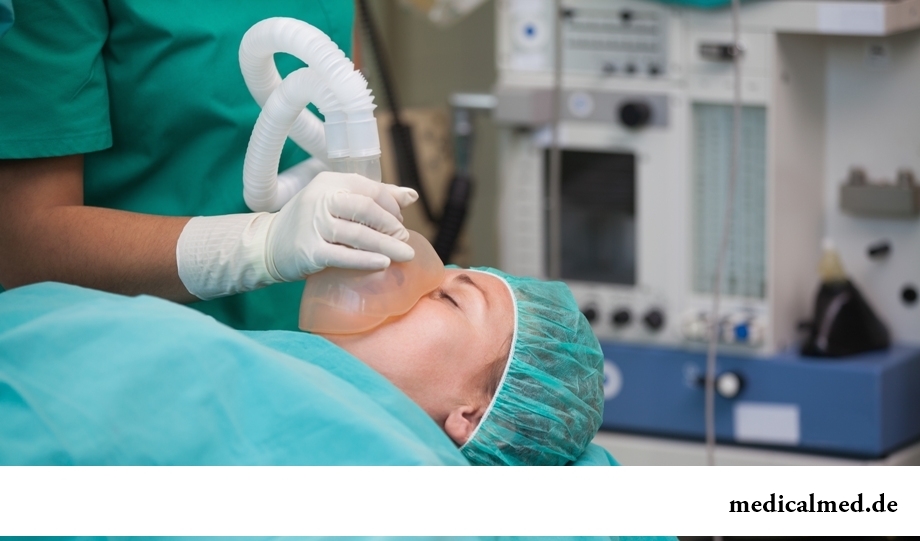





7 popular beliefs in an anesthesia
History of use of an anesthesia during operations contains more than 160 years. Annually in the world hundreds of thousands of surgical interventions during which to patients the substances immersing them in a dream and saving from pain are entered are carried out. Using an anesthesia many myths and delusions are still connected. It is worth getting acquainted with the most widespread of them.

1. The anesthesia gives a set of complications
At the first stages of development of anesthesiology side effects during use of the general anesthesia met in 70% of cases. Today complications of this sort happen from 1-2% of the patients who are exposed to surgical intervention using an anesthesia. In most cases it is allergic reactions to the entered substances. If operation is performed with participation of the experienced anesthesiologist reanimator, serious consequences usually manage to be avoided. The most terrible complication of use of an anesthesia is the acute anaphylaxis, but it occurs only at one patient from ten thousand.
After an anesthesia some patients test an indisposition which is shown by vomiting, nausea, dizziness, pain when swallowing, temporary decrease in memory or confusion of consciousness. All these symptoms disappear within several hours after awakening.
Contrary to popular belief, the general anesthesia does not make negative impact on cerebration.
2. Use of an anesthesia is not always justified
For domestic medicine rather truthfully opposite statement. Still many manipulations at us are made without anesthesia that is extremely heavy for patients and it is extremely inconvenient for doctors. Such provision is especially distributed in stomatology where within many decades almost all treatment (and besides very painful) was carried out "on live". Today many doctors in Russia try to apply more sparing techniques, and the situation changes for the better, but so far quite slowly.
3. It is possible not to wake up after an anesthesia
The vast majority of death of patients during operations is not connected with action of the medicines which are used for an anesthesia in any way. As a rule, the unexpected situation which developed in the course of intervention or a notorious human factor is the reason of a lethal case. During operation the patient's life true is in hands of the anesthesiologist reanimator. Unfortunately, deficit of such specialists in domestic hospitals makes about 50%. Until this problem is not solved, risk that the anesthesiologist overloaded with work at the wrong time will distract from the next patient or will allow some miss, will remain.
4. To the invention of an anesthesia patients seldom survived after operations
Substantially it so. In those days, when surgical interventions were carried out without anesthesia, at operations no more than 30% of patients survived. The risk that the patient will not transfer painful shock, was very high, and chances of survival directly depended on qualification and the speed of work of the doctor.
5. Under anesthetic the person observes erotic visions
The side effect such really is sometimes observed when using for an anesthesia of one of drugs – Sombrevinum. Until recently it was applied when carrying out short-term surgical interventions. Now use of Sombrevinum is forbidden in connection with high risk of development of allergic reactions and a large number of contraindications.
6. Action of an anesthesia can be interrupted during operation
The experienced anesthesiologist selects drugs, necessary for an anesthesia, in advance and calculates their dosage, proceeding from the weight of the patient and features of his state. During operation medicines move in the patient's blood stream by means of automatic dosers, and the equipment tracing the vital parameters controls amount of the arriving solutions and changes them at any aberration. Therefore the statement that it is possible to wake up before the end of operation because of "shortage of an anesthesia" is not true.

7. The anesthesia does not affect the drunk person
It is incorrect, however similar delusions nevertheless have real basis. The matter is that long alcohol intake leads to acceleration of process of a conclusion of an organism of some medicines. Their number includes also those substances which are used as an anesthesia. It means that the person who is in an ebrietas will fall asleep under the influence of similar means, but for deepening of an anesthesia higher doses of medicines can be required by him.
From illnesses which treatment requires surgical intervention nobody is insured. You should not be afraid of use of an anesthesia during operation. However, in order to avoid emergence of complications, the patient has to describe precisely the allergic reactions which are available for it and warn the anesthesiologist about all chronic diseases which he suffers.
Having fallen from a donkey, you more likely will kill yourself, than having fallen from a horse. Only do not try to disprove this statement.

Shops of household appliances offer us the huge choice of various devices for the house. Whether there are among this abundance devices which...
Section: Articles about health
The dietology, as well as other sciences, does not stand still. Food stuffs are exposed to comprehensive study, and scientists obtain new information on their properties and influence on a human body. Unfortunately, this reasonable and natural process from time to time д...
Section: Articles about health
Residents of big cities quite often have a disease which is known as the syndrome of chronic fatigue (SCF) today. This illness affects the people belonging to various social and demographic groups and living on all continents. Most of all SHU are subject women aged from 25 up to 45 years. Statistically, the number of cases fluctuates in the different countries from 10 to 37 people on 100 thousand, but specialists believe that these figures are significantly underestimated as people, страдающ...
Section: Articles about health
Eyes – unique body on the structure thanks to which the person obtains about 80% of information on the world around: about a form...
Section: Articles about health
The number of long-livers is very small. One person from 5 thousand lives up to age of 90 years, and the centenary boundary steps over only one of 20 thousand. However, doctors claim that each of us is quite able to affect own destiny. At the same time speech to Ida...
Section: Articles about health
About influence of fasting days on an organism it is told much – both about advantages, and about shortcomings. It is considered that fasting day in the form of a short-term monodiet is useful, promoting effective removal of slags from an organism whereas irregular, excessively long, spontaneous fasting days lead only to deterioration in health. How to derive benefit from the sparing diet and not to do much harm to itself? Let's consider the main advantages and shortcomings of fasting days and their influence on an org...
Section: Articles about health
So, you resolved to lose weight. And now you try to understand what to begin with: from exercise stresses or a diet? And how to make, h...
Section: Slideshow
Statistically, can only one of ten of our compatriots brag of a decent condition of an oral cavity. Six teeth affected with caries are the share of the average Russian. For comparison, this indicator for Europeans almost six times exchanges...
Section: Articles about health
On health of the person physicians know about salutary action of animals long ago. About 7 thousand years ago great Hippocrates recommended to the patients riding walks for strengthening of a nervous system and increase in vitality....
Section: Articles about health
The fatigue, sleep debt, disturbances of food, bad mood, vagaries of the weather – all these circumstances badly are reflected in our vn...
Section: Articles about health
All of us, unfortunately, should face flu nearly an every year. It would seem, so frequent disease has to be studied already up and down, and each person, at least once by it had (and the number of such people in our country aims at 100%), a dolzha...
Section: Articles about health
Antibiotics - - it is possible to call the chemical compounds suppressing growth of bacteria the break in the field of medicine which allowed to save mankind from many diseases incurable earlier: tuberculosis, plague, syphilis and many others. The contribution of drugs to rescue of people from epidemics of dangerous infections is huge, however at careless use antibiotics are capable to cause to an organism serious damage. Negative action can be shown in the form of easing of immunity, disturbance of balance of microflora in кишеч...
Section: Articles about health
The phenomenon of the panic attack is known long ago, but the reasons of its emergence still are up to the end not found out. It is established that more than 30%...
Section: Articles about health
Radiological methods of a research are applied in medicine more than hundred years, and thanks to them millions of lives were saved. In many cases without X-ray it is impossible to make exact idea of a condition of bodies and fabrics, it is correct to make the diagnosis. Those...
Section: Articles about health
For the person who daily since morning gathers for work it is very important to wake up vigorous and ready by day of work. Actually, each of us experiences difficulties with this, at first sight, simple business from time to time. After night rest exert impact on a condition of an organism the weather which collected for several days fatigue, household and office problems, quality of a dream and many other factors....
Section: Articles about health
Dark circles (bruises) under eyes – a shortcoming with most of which often fight against the help of cosmetics (proofreaders, salons...
Section: Articles about health
Statistically cystitis 25-30% of women up to 40 years have. With age this indicator raises, besides many do not get to statistics because do not see a doctor. The most sad that after the regular visits to doctors, long reception of antibiotics...
Section: Articles about health
Is told about advantage of domestic animals for development of the child much. But many parents nevertheless do not hurry to bring pets as are afraid that they can do harm to health of children. What troubles can really trap kids and how to make joint life of a family and domestic animals comfortable and safe?...
Section: Articles about health
It is possible to find the extensive range of fruit and vegetables in modern shops. Russians already got used that on counters in any...
Section: Articles about health
Wood louse – the ordinary-looking unpretentious plant extended in all territory of our country. It quickly expands, and sometimes fills sites, bringing a lot of chagrin to gardeners. Perhaps, they would be upset less if knew that the wood louse is the prices...
Section: Articles about health
Coffee - the tonic loved by many for the invigorating aroma and deep taste. Having the stimulating effect, coffee increases working capacity, promotes concentration of attention, fights against drowsiness and improves mood. Statistically, about 30% of inhabitants of the planet regularly use coffee, from them more than 8% are "coffee-achievers" - the persons using more than 3 cups of drink a day....
Section: Articles about health
It seems, quite recently you brought the baby from maternity hospital, but time flew by, and here it is already going to join the first...
Section: Articles about health
Turnip, radish, horse-radish – once these and other products enjoyed wide popularity at our ancestors, being not only the food sating an organism but also the medicines curing of many diseases. Unfortunately, having given the use of some of them...
Section: Articles about health
Each of us faces from time to time that other people need the immediate help. We react to it differently: one at once call doctors and police, others rush to victims and try to save them independently. Some pass by at all … Certainly, desire to help the neighbor who got into trouble, quite naturally for any decent person. However not everyone understands that to work in a similar situation, being guided by exclusively good...
Section: Articles about health
Bulimia and anorexia, are heavy deviations of a feeding behavior, become a cause of death of patients much more often than all others...
Section: Articles about health
Cystitis, or inflammation of a mucous membrane of a bladder, this very widespread disease which, owing to some features of a structure of bodies of urinogenital system, women have approximately four times more often than men. In the main risk group...
Section: Articles about health
History of cultivation of a buckwheat contains more than five thousand years. Grain which is received from this plant is used for preparation of porridges, soups, baked puddings and puddings, do flour which is one of the main ingredients of the noodles popular in many countries of it. Buckwheat dishes are useful and tasty, they are perfectly combined with meat, milk, eggs, mushrooms, fruit and vegetables....
Section: Articles about health
